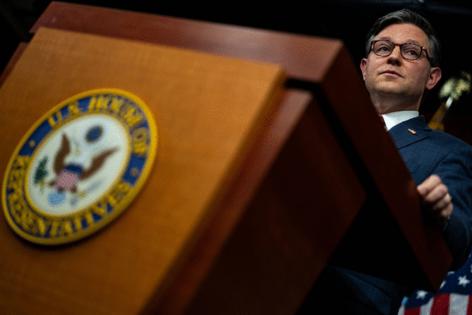Stopgap funding negotiations heat up after Johnson plan defeat
Published in News & Features
WASHINGTON — Bipartisan and bicameral talks to head off a partial government shutdown after next week appeared to be underway Thursday after the collapse of Speaker Mike Johnson’s two-part stopgap funding package Wednesday night.
Senate appropriators were in the paper-trading stage while, at least at the staff level, discussions were taking place among the “four corners” of the spending panels and congressional leadership in both chambers.
“We have just gotten some draft language from the Democrats and now we’re starting to enter into review and negotiation, which is a great relief since we have very few days left,” Senate Appropriations ranking member Susan Collins, R-Maine, said. While talks remain “at the very initial stages,” Collins said, other sources said a bipartisan proposal could be ready as soon as Monday.
To get the ball rolling procedurally, Senate Majority Leader Charles E. Schumer, D-N.Y., filed cloture Thursday to limit debate on the motion to proceed to an unrelated post office-naming bill that could be used to carry a short-term funding extension. If the Senate ends up going first — which wasn’t yet clear — Schumer’s move would set up a preliminary cloture vote Saturday.
“Both sides are going to spend the next few days trying to figure out the best path remaining for keeping the government open,” Schumer said on the floor. “By filing today, I am giving the Senate maximum flexibility for preventing a shutdown.”
Schumer wouldn’t discuss whether he’d spoken with Johnson after the speaker’s rejected attempt to pass a partisan stopgap bill Wednesday night. That six-month extension paired with an election security bill to require proof of citizenship was defeated, 202-220, after 14 Republicans joined with all but three Democrats to oppose it.
“I’m not negotiating in public,” Schumer told reporters.
On the House side, Minority Leader Hakeem Jeffries, D-N.Y., said Thursday morning he had not personally spoken with Johnson since Wednesday night’s vote, but that their staffs had been in contact.
Johnson aides couldn’t immediately be reached for comment on Thursday. Late Wednesday, the speaker suggested he was open to other alternative stopgap measures.
“We’ll draw up another play, and we’ll come up with a solution. I’m already talking to colleagues about their many ideas,” he said. “We have time to fix the situation and we’ll get right to it.”
Lawmakers now have little more than a week to draft and pass a continuing resolution before the new fiscal year begins Oct. 1. They are scheduled to leave town on Friday, Sept. 27, to go home and campaign for reelection all next month.
Democrats, along with some GOP appropriators, have pushed for an extension running to Dec. 13. Johnson’s bill would have extended funding through March 28 to give Republicans greater leverage over final fiscal 2025 spending decisions in the New Year if they sweep the November elections.
After the defeat of Johnson’s initial proposal Wednesday night, some House lawmakers said members of both parties would likely be on board with a mid-December CR, as long as it was “clean” of extraneous partisan riders. They said it would probably pass even under suspension of the rules, which requires the support two-thirds of members present and voting.
House Freedom Caucus Chairman Andy Harris, R-Md., said a stopgap bill into December was “on the table” and urged Johnson to move a bill before the Senate does, as the House is the more procedurally nimble chamber.
“So we could clearly be the first to the finish line, and I think that gives the speaker a lot of leverage in what the final product looks like,” Harris said.
_____
(Paul M. Krawzak and Aidan Quigley contributed to this report.)
_____
©2024 CQ-Roll Call, Inc., All Rights Reserved. Visit cqrollcall.com. Distributed by Tribune Content Agency, LLC.







Comments